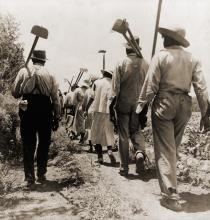Commentary
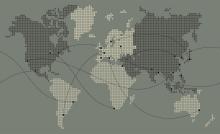
IN MID-DECEMBER, trade talks involving almost every country in the world closed in Nairobi. Did anyone hear the door slam?
Previous negotiations of the World Trade Organization (WTO) have been sites of furious protest and resistance by tens of thousands of people, including small farmers, trade unionists, anti-globalization activists, and faith and development organizations. (The 1999 negotiations were called the “battle in Seattle” for good reason.)
While the Nairobi meetings held some similarities to previous WTO negotiations—fears that no agreement would be reached and entrenched positions by the global North and South—other aspects were entirely different, including the way civil society is organized for engagement.
In the last two years, we have witnessed the rise of megaregional trade deals. The Transatlantic Trade and Investment Partnership (T-TIP) between the U.S. and the European Union is one example, but there are many others under negotiation. The Comprehensive Economic and Trade Agreement between Canada and the E.U. has been finalized and the text is awaiting parliamentary agreements some time in 2016. The Trans-Pacific Partnership (TPP) between the U.S. and many Pacific Rim countries was agreed upon in October 2015 and is waiting for governments to ratify it. The Trade In Services Agreement is in its 15th round of negotiations involving more than 50 countries.
These deals have many similarities. They are designed to open up new markets for global corporations and create the conditions for them to be as lucrative as possible. Perceived “barriers” to trade, such as fair labor standards, food safety regulations, and publicly provided services, are to be reduced or removed.
Additional legal protections to safeguard corporate profits from the effects of national government policies (such as raising the minimum wage or introducing plain-packaging on tobacco products) will be introduced. And, of course, the negotiations are held in secret, away from democratic scrutiny.

THE LAST GUN-MURDER massacre in Australia happened in April 1996.
I remember it clearly. My wife and I were preparing to move from our home in Sydney to California, where I’d been accepted to study at Fuller Theological Seminary. After 13 years of a Labor government in Australia, Conservative John Howard had just been elected prime minister. My wife and I joked that it was a good time to leave the country. Then the Port Arthur massacre occurred—35 people were killed, 23 were wounded.
What happened next was astounding. The senior leaders of both major political parties, at both the federal and state levels, faced down opponents and enacted far-reaching and effective new gun laws.
What came to be called the National Firearms Agreement banned the importation, sale, and possession of all automatic and semi-automatic rifles and shotguns (most handguns were already illegal) and enacted a compulsory gun buy-back scheme.
The new agreement for gun ownership allowed guns to the military, police, and those employed to shoot feral animals. The new federal laws were enacted unilaterally across state rights. Controversially in light of Second Amendment rights in the U.S., the act specifically stated “that personal protection not be regarded as a genuine reason for owning, possessing, or using a firearm.” However, genuine reasons included “sporting shooters” with valid club memberships, hunters with proof of permission, and “bona fide collectors of lawful firearms.”
The new gun laws were passed quickly, accompanied by an amnesty for any unlicensed firearms.
As we packed our bags to move to the United States, images filled the nightly television news of police stations across Australia full of firearms of varying shapes, sizes, and states of legality. These were guns that were voluntarily surrendered, in addition to those gathered through the formal buy-back program.It was more than politics. It was a national moment.

IN NOVEMBER, the Fifth Circuit Court of Appeals blocked a series of Obama administration executive orders intended to shield millions of immigrants from deportation.
Of course, there’s a backstory: After the 2014 failure of Congress to pass comprehensive immigration reform, President Obama attempted to create one program, called Deferred Action for Parents of Americans and Lawful Permanent Residents (DAPA), and expand an existing one, called Deferred Action for Childhood Arrivals (DACA).
As its name suggests, DACA was created to protect children—more than 1.7 million, according to the Migration Policy Institute—who were brought to the United States before they turned 16. These “Dreamers” have become a visible and powerful political movement. DAPA is intended to provide work permits and exemption from deportation to those adults with children who are U.S. citizens or lawful permanent residents.
In the dangerous environment created by our failed immigration policy, these two protections are essential for keeping families safe and together.
But when the Obama administration announced these programs in November 2014, some states claimed that expanding the number of immigrants allowed to stay in the U.S. would cause an unfair increase in the cost of state services. Ultimately, 26 states sued to stop the DAPA/DACA changes. In November 2015, the Fifth Circuit—which covers Louisiana, Mississippi, and Texas—found in favor of the states. The Justice Department then appealed the decision to the U.S. Supreme Court, which is likely to decide the case before a new president takes office.
Immigrant and family advocates, along with religious leaders, criticized the ruling. “After the Fifth Circuit’s decision concerning DACA and DAPA, what remains abundantly clear is that the U.S. Congress needs to urgently address immigration reform,” said Gabriel Salguero, president of the National Latino Evangelical Coalition. “Hispanic Evangelicals are looking for genuine leadership on this issue. No more delays and excuses.”
Nineteen faith-based organizations (including Sojourners) filed an amicus brief with the Fifth Circuit Court to advocate alongside individuals seeking relief from deportation, and churches across the country had begun to prepare members to apply for DAPA and the expanded DACA.

PAYDAY AND CAR-TITLE loans are marketed as a quick fix to help struggling families through a financial emergency. Advertised as “EZ Cash” and “24-7 Finance,” the perils of payday loans, with exorbitant interest rates upward of 300 percent, trap households in long-term debt.
The Christian witness on lending encompasses both a prohibition against exploiting the poor with excessive interest as well as a call to steward God-given financial resources. The launch of a diverse Faith for Just Lending coalition in May challenging predatory payday lending, recent state campaigns seeking to cap the rate on payday loans, and the Consumer Financial Protection Bureau’s announcement to establish rules for payday, car-title, and high-cost installment loans all signal important public steps toward the first goal: stopping unscrupulous businesses from preying on those who are poor.
Now we must examine how to steward a financial environment where responsible lending will flourish. Many of the same groups who have opposed predatory lending are now addressing how to offer credit that empowers their neighbors rather than preys upon them. In Minnesota, Exodus Lending extends low-interest loans to help individuals pay off their payday loans. In Louisiana, the Church for the Highlands partnered with other churches and a local credit union to pay off loans when the borrower cannot. (So far, no one in the program has defaulted.) Catholic Charities of Northern Kansas hosts a loan repayment pool and invites clients into a peer mentoring relationship for financial counseling.
While churches and congregations offer a uniquely relational and holistic form of lending, other institutions can also play an important role. In Mississippi, the New Roots Credit Partnership helps employers offer low-cost loans through their payroll system. Texas’ Community Loan Center of the Rio Grande Valley offers a similar program. Employer-based programs can offer a scale and an infrastructure that keep costs down.
Some have proposed converting the U.S. Postal Service into a postal bank to provide access to simple financial services, prepaid card services, and responsible small-dollar loans. Advocates see it as a “public option” for financial services built on the existing USPS physical infrastructure and repository of public trust, though it’s an option that ultimately relies on partnership with traditional banks.
Banks and credit unions will continue to be critical players in the large-scale financial services market. They are also the ones largely to blame for gaps that exist in the small-dollar credit market. Rather than finding ways to help customers manage their cash flow and build up savings, banks lie in wait, benefitting when customers trip up. Many banks and credit unions maximize their income through carefully designed overdraft programs, which account for about 60 percent of bank fee revenue. These banks assess $35 overdraft fees each time someone overdraws an account, essentially providing a high-cost form of credit that can cost households hundreds of dollars per year. For low-income households, especially those with uneven income and work hours, this amounts to one more poverty penalty.
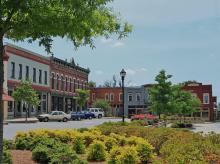
LAST FALL, MAYORS of 18 U.S. cities sent a letter to President Obama, promising to welcome Syrian refugees with open arms. Atop the list was Ed Pawlowski, the mayor of Allentown, Pennsylvania’s third largest city.
Pawlowski said his evangelical Christian faith—and America’s founding ideals—shaped his decision. “We like to say that America was built on Judeo-Christian principles,” he told Sojourners. “Then let’s follow our Judeo-Christian principles, which tell us to welcome the stranger because we were once strangers ourselves.” So far, about 10 Syrian refugee families have come to Allentown in the past year. More are expected.
There’s been some pushback from older Syrian immigrants in the community. Allentown is home to about 5,000 Syrians, many of them Christians who fled persecution in the past. Most of the new arrivals are Muslim.
Aziz Wehbey, head of the local American Amarian Syrian Charity Society, told CBS News he had concerns about the background checks on the new arrivals. “We need to know who we are welcoming in our society,” said Wehbey.
Another local Syrian charity, the Syrian Arab American Charity Association, has collected donations of food, furniture, and clothing for the refugees. So has St. George Antiochian Orthodox Church, where many Syrian immigrants worship.
Pawlowksi has spent a great deal of time talking to residents about their fears, such as concerns that the area will become “overrun” with refugees. He stressed that only a few families are coming to Allentown. They’ve lost everything, the mayor said, and need help: “We can handle this.”

IN OCTOBER, China’s Communist Party leadership announced the end of its nearly 40-year-old “one child” policy, announcing that all married couples could now have two children.
The one-child policy in China was established by Deng Xiaoping in the mid-1970s, first as a voluntary program, then as federal policy. He said it was necessary to make sure that “the fruits of economic growth are not devoured by population growth.” His tool for ensuring economic growth was the large-scale control of women’s bodies. The results have been well-documented: massive numbers of coerced abortions and sterilizations and women with “unapproved” pregnancies avoiding prenatal medical care for fear of such coercion. Women have been and continue to be intensely traumatized by a government policy that is indifferent to their pain.
This policy has also disrupted the gender balance in China. The introduction of ultrasound technology that easily identifies the baby’s gender in utero has led to female feticide—sex-selective abortions. Millions of little girls are dead because they were girls and not boys. Women are aborting their daughters because of their shared gender. What does this do to women’s own self-esteem and self-image?
This is not a glitch in China’s system of population control, but a central feature of it. If you have 50 women and one polygamous man, you can have many babies at once. But if you have 50 men and one woman, you get no more babies than if you have only one fertile man and one woman. If reducing the overall number of people is your goal, then targeting females gets you more bang for the buck, so to speak.

EVERY TIME I travel from Erbil, the capital of Iraqi Kurdistan, to Dohuk, Iraq, my drivers point to the same bridge. This, they say, is where ISIS was stopped by U.S. air power, just 15 miles from Erbil. It is a vital reminder that Kurdistan has twice been a safe haven: in the 1991 aftermath of the first Gulf War, to protect the Kurds from Saddam Hussein, and again last year when ISIS was at the city gates.
When I look on the Nineveh Plain just south of Kurdistan, it’s hard not to recall Cyrus the Great, who once conquered this entire part of the world. The book of Isaiah recounts God’s words to the mighty king, a nonbeliever, one who didn’t follow the God of Israel: “For the sake of Jacob my servant, of Israel my chosen, I summon you by name and bestow on you a title of honor, though you do not acknowledge me” (emphasis added).
The chaos and violence in this region continues to drive people from their homes. Currently, Kurdistan is the temporary “home” of 1.1 million people fleeing ISIS. Most are people of faith—Muslims, Christians, and Yazidis. The ripple effects spread out to refugee camps from Jordan to Germany.
Many U.S. Christians don’t think of God when it comes to geopolitics. We sometimes reduce Christ “the Lord of all” to Christ “our personal savior.” We might not be comfortable with the idea that if Christ is truly sovereign, then that includes our global politics.
As people of faith, we never give up hope, even in the violent situation in the Middle East, which promises to get worse before it gets better. Here are three steps you can take to address the ISIS crisis and its violent ripple effects:
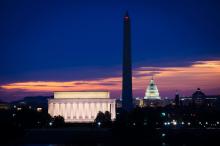
SHORTLY AFTER THE November mid-term elections, Pope Francis officially launched a campaign of his own—although one with a decidedly different tone than that of most politicians. Dec. 8 marked the start of the “year of mercy,” which in Francis’ words is a chance for the church to consider how it “can make more evident its mission of being a witness of mercy.”
This challenge is not one that seems to have taken root in our political conversation, and I’ve seen little evidence of it in the presidential candidate debates. In a year when we will democratically elect a leader of one of the most powerful nations in the world, how will mercy figure into the strategy?
Specially designated “jubilee years” are a Christian tradition that began in the early 14th century, based on the biblical mandate in Leviticus 25 and Jesus’ call for the “year of the Lord’s favor” in Luke 4. In the Catholic tradition, jubilee years serve as calls to grow in one’s relationship with God through prayer, blessings, and penance.
Of course, calling this time a year of mercy doesn’t mean that it’s the only year we are called to focus on mercy; rather it is an effort to get the church and the world to consider the quality of mercy more closely, more deeply, so it permeates our daily lives and influences our actions. (Like a New Year’s resolution that actually sticks!)

DURING A TRIP to Alaska in September, President Obama announced that the name of Mount McKinley, the highest peak in North America, would be officially restored to Denali, the Koyukon Athabascan name that means “the tall one.” This is the name the Athabascan people have used for the mountain for centuries. “This designation recognizes the sacred status of Denali to generations of Alaska Natives,” announced the White House.
Apparently, William Dickey, a gold prospector in Alaska, coined the name Mount McKinley “after William McKinley of Ohio, who had been nominated for the presidency, and that fact was the first news we received on our way out of [that] wonderful wilderness,” Dickey wrote in 1896. McKinley was elected the 25th president, but he was assassinated in his second term, never having set foot in Alaska.
Restoring the mountain’s rightful name has been a passionate issue for Alaska Natives for more than 100 years.
A few years ago a Native elder was asked for his thoughts on the millions of European immigrants who had flooded Turtle Island, as North America is known to many Native people, to establish a new nation. “They’ll leave,” he said. “Eventually, after they have used up all the resources and the land is no longer profitable for them, they’ll leave. They’ll move on to someplace different. And then we, the Indigenous people, will nurse our land back to health.” That is an incredible perspective from a wise man who has seen the lands of his ancestors senselessly exploited by generations of foreigners.
From a Native American perspective, the U.S. is a country of more than 300 million undocumented immigrants. People from all over the world have left their lands, their homes, their families, and everything they knew and loved to come here. They flocked to this “new world” largely in pursuit of a dream of financial prosperity. But they never asked for permission to be here, nor has permission ever been given.
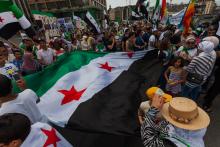
THE MOST CRITICAL priority for the international community regarding Syria—in addition to addressing the immediate humanitarian needs—is to implement a cease-fire in as much of the country as possible. An arms moratorium on both the regime and rebel groups must be implemented and strictly enforced. And negotiations for a more democratic and representative government should move forward, even if it initially includes important foreign and domestic elements who do not share those values.
Especially in response to Russian military actions in Syria, President Obama is being pressured by both Republicans and Democratic hawks to militarize the situation further by sending more arms to rebel groups and increasing direct U.S. military involvement. As problematic as such military responses may be, the diplomatic alternatives aren’t much better.
Some of the most powerful opposition forces—the so-called Islamic State (ISIS) and other hardline Islamists in the al- Nusra Front—appear to have little interest in negotiations. And the prospect of working out an arrangement that would keep in power Assad’s brutal regime, which has been responsible for the vast majority of the more than 100,000 civilian deaths in the nearly five-year conflict, is extremely hard to accept.
Unfortunately, unlike most dictatorships that have been overthrown by armed or unarmed struggle in recent decades, the power in Damascus does not rest in the hands of a single dictator. Assad heads a longstanding ruling apparatus led by the Baath Party and the military that, despite its corruption and brutality, still has a social base. A fairly large minority of Syrians—consisting of Alawites, Christians and other minority communities; Baath Party loyalists and government employees; the professional armed forces and security services; and the largely Sunni crony capitalist class that the regime has nurtured—still cling to Assad’s government.
They constitute a large enough segment of Syrian society so that no anti-regime struggle can win without cascading defections, which is unlikely when the alternative is perceived to be rule by totalitarian Salafists such as ISIS.
During the first six months of the uprising in 2011, when the anti-regime movement was largely nonviolent, pro-democratic, and more diverse in terms of support, it appeared the regime could be eventually toppled. Now, in the context of armed struggle and the rise of Islamist extremists, many who once were working to topple the regime see it as the lesser evil.
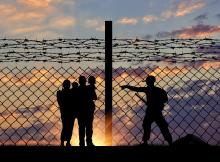
THE FAMILIES arriving at the Sacred Heart Humanitarian Respite Center in McAllen, Texas, all come with one thing in common—a high sense of hope and faith in God. Much like the Holy Family, these families were forced to flee because they feared for the lives of their children.
Catholic Charities of the Rio Grande Valley began a humanitarian crisis-relief program in the summer of 2014 to respond to the influx of immigrants crossing the border who didn’t have a place to rest. Many are fleeing the violence in Central America. In El Salvador, for example, the murder rate has more than doubled since 2012 and soon will pass that of Honduras, which has the highest murder rate per capita in the world.
With the help of Sacred Heart Catholic Church and hundreds of volunteers, we were able to open a place of safety for refugees before they continue on their journey. For these holy families, it is the love for their children that moves them to face all possible dangers by traveling north.
In the biblical story, St. Joseph was a “just man” and faithful. He was forewarned of Herod’s imperial violence and fled the country to protect his wife and infant son. At our center the fathers are also men of profound dedication and attentiveness to the needs of their families.
One young dad had left his home in Central America with his pregnant wife and their two little girls. His wife gave birth in Mexico. As they prepared to cross the Rio Grande into the U.S., he and the baby became separated from his wife and two daughters. He lost them. When he and the 1-month-old baby arrived at our center, he had no idea if his wife and two little girls were alive or if he would ever see them again.

LAST NOVEMBER, when my daughter turned 2 weeks old, I returned to full-time work. Five days after her birth I was on email. Within a week I was taking work calls. I wasn’t a workaholic. I was a new mom without paid family leave.
Several years earlier, when I was single and singularly focused on my career, I’d been hired as a contractor for the United Methodist Church to direct a grassroots campaign on maternal health. I never stopped to consider what effect my employment status might have if I decided to have a child of my own. When my husband and I got pregnant, I faced the stark reality that there were no policies in place to protect or support me.
Sadly, my experience is commonplace. A recent report revealed that one in four U.S. women return to work within two weeks of giving birth. While the Family and Medical Leave Act (FMLA) protects employees’ jobs for up to 12 weeks after the birth or adoption of a child, only about 60 percent of U.S. workers meet the eligibility requirements, including only 19 percent of new moms. And since the FMLA does not require employers to provide paid leave, those who are eligible and need time off do not always take it because they cannot afford the loss of income.
With no federal paid-family-leave program and only a handful of states with their own, churches and other employers that do provide paid parental leave are left to foot the bill for it. Oftentimes they offer this benefit exclusively to their highest earners. The United Methodist Church, for example, does have a national parental-leave policy of up to 12 paid weeks, but it is only available to pastors. Staff of the denomination’s agencies, such as the one I work for, are offered up to 18 days of paid leave, after which they must use accumulated vacation or sick days or take unpaid leave. But as a lay person and a contractor, I was not eligible for either policy.

IN DECEMBER 2011, Eddie Bocanegra, a congregational organizer-in-training, invited me to a meeting held by members of the Illinois-based Community Renewal Society (CRS), a faith-based organization that works with communities to address institutional racism and poverty. I was researching how faith-based organizations facilitated recovery from gang life. However, I was also to learn how formerly incarcerated persons use faith to change their communities.
There were 30 people at the meeting—black, white, and Latino—from diverse Christian backgrounds: Baptist, Catholic, and Eastern Orthodox. First, Bocanegra shared his testimony: The Illinois governor and the United Nations had recognized Bocanegra for his work in violence prevention, but the stigma of his old gang life and criminal record overshadowed his qualifications for employment.
We were asked to think of solutions to “records discrimination.” One person recalled visiting the state capital to lobby for ban-the-box legislation to remove the felony conviction question from employment applications. From that meeting arose a campaign against records discrimination. With the guidance of a CRS organizer, Bocanegra helped found and lead an ex-offender-led civic group called Fighting to Overcome Records and Create Equality (FORCE). Eighteen months later, FORCE earned its first legislative victory: Illinois House Bill 3061, which expanded the list of offenses that can be sealed for employment application background checks.
The National Employment Law Project reports that people like Bocanegra are not alone—65 million Americans have a criminal record. Even for those with low-level convictions, a criminal record carries a stigma and often relegates them to unemployment. While the dominant narrative of re-entry tells us that if the formerly incarcerated obey laws and accept social conditions they will be redeemed as good citizens, this is simply not true. In fact, such “blanket discrimination” against formerly incarcerated persons has a racially disparate impact that violates Title VII of the Civil Rights Act.

IT SEEMS AS though after liberation, the voice of conscience left the South African public sphere and retired to a quiet church life, so that the current generation barely knows that the church ever influenced South African political and public affairs.
On the day of Nelson Mandela’s inauguration, Archbishop Desmond Tutu famously announced that he was returning to do the “real” business of the church by leaving politics to qualified politicians. Years later, during the era of President Jacob Zuma, Tutu often lamented about the undesirable state of the country under the current leaders. He must have forgotten that by leaving politics to politicians in 1994, he too played a role in leading the nation to this position he now regrets.
Kairos South Africa recently celebrated its 30th anniversary. Church leaders from as far as Norway, the U.S., and Palestine all remembered how the 1985 Kairos document taught the worldwide church a hopeful language to address injustice. Yet now the majority of young people in South Africa do not know anything about this heroic church history.
South African anti-apartheid leader Allan Boesak referred to the Kairos movement as a “dangerous memory.” It does indeed have the potential to be a dangerous memory—one that should be remembered by every one of the Christians who make up 81 percent of the South African population. Unfortunately, it is a memory held by only a select older minority.
How can this change? This summer several members of the new generation of South African Christian leaders traveled to the U.S. to study how to be effective Christian agents of social justice. At the Wild Goose Festival in North Carolina, I listened to Bree Newsome explain that it was her faith in God that gave her the courage to pull down the Confederate flag at the South Carolina capitol after the massacre at Emanuel AME Church in Charleston. “You come against me with hatred and oppression and violence. I come against you in the name of God. This flag comes down today!” she said.
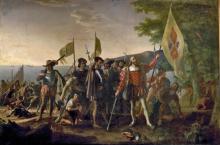
POPE FRANCIS arrives in the U.S. this September to great acclaim. The popular pontiff will speak truth to power in Congress and at the United Nations and preach the necessity of stewarding creation, promoting an economy for life, and defending human dignity.
He also will canonize Junípero Serra, the Spanish Franciscan missionary who founded the first nine of 21 Spanish missions in California in the 18th century—many say on the backs of Indigenous people. While some call Serra a “shepherd and protector,” others argue he symbolizes the colonial conquest of North America through genocide.
Serra was a human being—sometimes noble, sometimes not. However, his conquest operated under a body of Christian law and policy called the Doctrine of Discovery, a series of papal documents (“bulls”) that granted legal right of ownership to whichever European Christian nation arrived first in the new territory. Since 1823 it has also been enshrined in U.S. law. As recently as 2005, Supreme Court Justice Ruth Bader Ginsburg cited it as the basis for denying a land claim by the Oneida people, one of the five founding nations of the Iroquois Confederacy.
The Doctrine of Discovery is based on a principle of Roman law called terra nullius (“nobody’s land”) and grew out of the church’s conviction that “discovered” lands were devoid of human beings if the original people who lived there (defined as “heathens, pagans, and infidels”) were not ruled by a Christian ruler. “The Doctrine mandated Christian European countries to attack, enslave, and kill the Indigenous Peoples they encountered and to acquire all of their assets,” wrote the World Council of Churches in a 2012 statement.

THE DEMOCRATIC REPUBLIC of Congo is one of the world’s poorest countries. In 2014, Congo ranked 186 out of 187 on the United Nations’ human development index—vying with Niger for the bottom of the list.
Yet Congo is extremely rich in soil, water, forests, and minerals. Diamonds, copper, gold, oil, uranium, and coltan are all mined, purchased, and traded from the DRC.
Coltan is the ore used in electronic devices. The so call “war of coltan” in the mineral-rich eastern Congo has left millions dead and more than a million women raped. Transnational corporations are able to exert extreme pressure on Congo’s weak government and economy. As a result, the country’s natural resources have become an important factor in increasing poverty and violence rather than wealth and development.
The Catholic bishops in Congo (about half of the country’s population is Catholic) repeatedly have denounced three specific kinds of evil: a climate favoring genocide, outbreaks of religious fundamentalism, and a push toward Balkanization.
Sébastien Muyengo, author of In the Land of Gold and Blood, is the Catholic bishop of Uvira in eastern Congo. As a result of the mineral wars, he writes, the country’s poverty has become a mental, human, and structural poverty, rather than predominantly material. Yet Congo has resources the rest of the world wants.
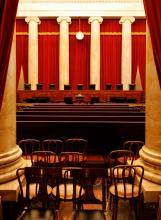
THIS SUMMER’S ATTEMPT to dismantle the Affordable Care Act began as the very height of frivolous lawsuits. Cooked up with the help of the Competitive Enterprise Institute, a libertarian think tank, the case (King v. Burwell) depended upon a very narrow reading of four words in Section 36B of the ACA: “established by the State.”
Essentially, Obamacare foes argued that Congress intended to provide health-care subsidies (or tax credits) only to those Americans living in states with state-operated insurance exchanges. Those who lived in states without exchanges—including Florida, Texas, Wisconsin, and others—and were, therefore, dependent upon the federal exchange would be ineligible for subsidies.
Of course, Congress intended no such thing—as the Supreme Court upheld. Throughout dozens of hearings and hundreds of hours of debate, it was clear that ACA subsidies would be available to every American, regardless of what state they lived in.
In a 6-3 ruling, the court rejected King, with Chief Justice Roberts explaining, “A fair reading of legislation demands a fair understanding of the legislative plan. Congress passed the Affordable Care Act to improve health insurance markets, not to destroy them.”
Had the suit carried the day, 6.4 million Americans would have lost their subsidies.
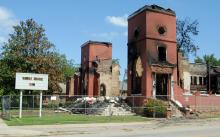
AS I RECENTLY recalled that summer of 1964, I was reminded that slavery was our original sin. Race remains our unresolved dilemma, and today the bombers are back. From an urban church in Knoxville, Tenn., to countless rural churches in South Carolina, Virginia, ... and Alabama, the flames of arson and the hatreds of racism burn again.
On the narrow subject of burning churches, there has been rare bipartisan outrage. Conservative Rep. Sen. Lauch Faircloth of North Carolina said on the Senate floor, “If we in Congress cannot agree that church burning is a despicable crime, what can we agree on? It’s not a matter of liberals, conservatives, blacks, whites; it is about justice, faith, right, wrong.” He and Sen. Ted Kennedy introduced a bill to toughen the laws against church arson.
Well-meaning whites have also stepped forward to help rebuild churches. The National Council of Churches and the Anti-Defamation League have established national rebuilding funds.
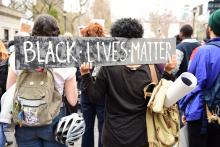
PEOPLE HAVE CALLED me a lot of things: Host pastor of the #BlackLivesMatter freedom ride; student of teenage and Millennial activists; leader of a state commission advocating policy change; bail negotiator; street agitator; and militant mediator. Since the Holy Spirit was poured out onto the streets of Ferguson, Mo., and St. Louis in the wake of Michael Brown’s death, I’ve been called and challenged to play these roles—and more.
Yes, I did say the Holy Spirit. The same Spirit that fell at Pentecost as a dynamic demonstration of God’s power to overcome the barriers of language, ethnicity, gender, class, and sexual orientation. The Spirit of hope that caused a community once rebuked for its broken dialect to speak with one voice. The Spirit of holiness that enabled a people dismissed for “drunkenness” (see Acts 2:15) to form the first fruits of the church.
We may have missed it because those the Spirit fell on nearly a year ago weren’t wearing robes and stoles, but hoodies and bandanas. They weren’t singing anthems and hymns, but chanting what some would call obscenities. They weren’t called saints and disciples by the media, but thugs and outside agitators.
But last summer, in the week between Michael Brown’s death on Aug. 9 and Missouri Gov. Jay Nixon’s declaration of a state of emergency on Aug. 16, the Spirit was poured upon “all flesh” and our sons and daughters began to prophesy.
